any downhill hiking resources?
-
MattCav
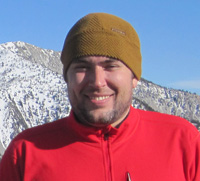
- Posts: 356
- Joined: Thu Sep 23, 2010 4:13 am
hey guys-
i'm really strong going uphill but want to get better at my downhill skills. are there any sites or resources you'd recommend for learning downhill techniques (scrambling, screen-skiing, snow hiking, etc....)? i did a quick google search last night and found a few articles on about.com and some other sites but nothing that seemed too enlightening.
thanks!
i'm really strong going uphill but want to get better at my downhill skills. are there any sites or resources you'd recommend for learning downhill techniques (scrambling, screen-skiing, snow hiking, etc....)? i did a quick google search last night and found a few articles on about.com and some other sites but nothing that seemed too enlightening.
thanks!
-
Taco
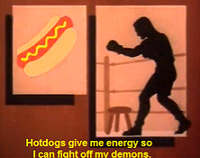
- Snownado survivor
- Posts: 6175
- Joined: Thu Sep 27, 2007 4:35 pm
Not that I know of. I was terrible at scree skiing for a while until hiking with Travis.
Go down Baldy Bowl as fast as you can (no snow) and you'll get good. Real fast. Real fun.
Go down Baldy Bowl as fast as you can (no snow) and you'll get good. Real fast. Real fun.
-
VermillionPearlGirl
- Posts: 239
- Joined: Wed Apr 06, 2011 9:57 am
I'd be interested if you find anything because I feel like I struggle with this a little bit.
Although I find sliding down on my bum to be an effective tactic in certain situations
Although I find sliding down on my bum to be an effective tactic in certain situations
-
Ze Hiker
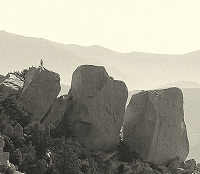
- Posts: 1432
- Joined: Mon Jul 28, 2008 7:14 pm
An interesting topic. A combination of things will help.
Keep in mind on these surfaces, it is necessary to push down harder than normal, and be okay with the inherent instability of the surface (you don't know exactly what you are going to get). So you need to have good dynamic balance.
Many people try to tread too lightly and end up not taking advantage of the potential "give" these surfaces have.
1) Leg strength - squats, lunges, etc... important to have good leg strength that can quickly respond to changes in demand. You push down hard on scree or snow, but at some points it may resist more or less than you expect. Your muscles need to be ready.
2) Dynamic balance - unstable bosu ball - these surfaces are unstable meaning you can't place your foot out and expect to know exactly what you are going to get back. Your leg and body position and muscles have to "hedge" the risk of being out of position. Practice on unstable surfaces like those half-sphere bosu balls to improve reaction time.
3) Footwork - all sorts of footwork drills you could do - you need to learn to vary the sort of steps you take, from small to large, and how to quickly recover. Everyone is going to slip or be out of position, but some end up configuring their body to recover more quickly so it doesn't end up bad.
Obviously, practicing on the surface, gradually trying more and more aggressive tactics is best.
Keep in mind on these surfaces, it is necessary to push down harder than normal, and be okay with the inherent instability of the surface (you don't know exactly what you are going to get). So you need to have good dynamic balance.
Many people try to tread too lightly and end up not taking advantage of the potential "give" these surfaces have.
1) Leg strength - squats, lunges, etc... important to have good leg strength that can quickly respond to changes in demand. You push down hard on scree or snow, but at some points it may resist more or less than you expect. Your muscles need to be ready.
2) Dynamic balance - unstable bosu ball - these surfaces are unstable meaning you can't place your foot out and expect to know exactly what you are going to get back. Your leg and body position and muscles have to "hedge" the risk of being out of position. Practice on unstable surfaces like those half-sphere bosu balls to improve reaction time.
3) Footwork - all sorts of footwork drills you could do - you need to learn to vary the sort of steps you take, from small to large, and how to quickly recover. Everyone is going to slip or be out of position, but some end up configuring their body to recover more quickly so it doesn't end up bad.
Obviously, practicing on the surface, gradually trying more and more aggressive tactics is best.
-
DukeJH
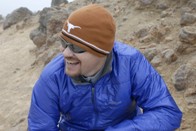
- Posts: 65
- Joined: Fri Jan 07, 2011 11:14 am
Early in my mountaineering career I found myself trying to really cushion each step on the downhill by leaning back and absorbing the load with my knees and quads. This slowed me down, tired me out and led to some knee problems. I learned to lean forward and let gravity pull you down the mountain.
Scree slopes can be skied or plunge stepped. Lean forward and firmly plant your heel. You'll slide some but then foot will come to rest. If not, you're skiing.
Talus can be inherently unstable as well. I found that by leaning downhill and not firmly planting my feet (to allow my knees and ankles some flexibilty to adapt to the uneven and unstable surface) and looking two to three steps ahead, I can move more quickly down the mountain more fluidly; almost like prancing (but I land on my heel). Visualize a cat as it quickly balances its way across a tree branch, not leaving its feet in one place for any appreciable amount of time.
Hope this helps!
Scree slopes can be skied or plunge stepped. Lean forward and firmly plant your heel. You'll slide some but then foot will come to rest. If not, you're skiing.
Talus can be inherently unstable as well. I found that by leaning downhill and not firmly planting my feet (to allow my knees and ankles some flexibilty to adapt to the uneven and unstable surface) and looking two to three steps ahead, I can move more quickly down the mountain more fluidly; almost like prancing (but I land on my heel). Visualize a cat as it quickly balances its way across a tree branch, not leaving its feet in one place for any appreciable amount of time.
Hope this helps!
-
MattCav

- Posts: 356
- Joined: Thu Sep 23, 2010 4:13 am
this is good stuff so far, guys. thanks for the tips.
one question i have: i've seen people go straight down (like in a running pose) and others do more of a snowboard type of posture, where the person is going down sideways. which way is safer/better?
Ze - this would be an AWESOME article for hikingscience.blogspot.com
one question i have: i've seen people go straight down (like in a running pose) and others do more of a snowboard type of posture, where the person is going down sideways. which way is safer/better?
Ze - this would be an AWESOME article for hikingscience.blogspot.com
-
tracker
- Posts: 199
- Joined: Wed Jul 25, 2012 11:20 pm
Snowboard style works best for me. If the slope is steep and the material is loose and giving way I alternate my weight on both feet, but never change which foot is forward.
This may sound silly but if you are right-handed you should blade your right side and foot forward. Lefties can often lead with either foot.
This may sound silly but if you are right-handed you should blade your right side and foot forward. Lefties can often lead with either foot.
-
MattCav

- Posts: 356
- Joined: Thu Sep 23, 2010 4:13 am
why is that tracker?This may sound silly but if you are right-handed you should blade your right side and foot forward. Lefties can often lead with either foot.
-
AW~

- Posts: 2109
- Joined: Mon Oct 01, 2007 12:00 pm
I try to do whatever is the least impact from ATVing. I rarely travel straight down in a straight line, unless its a 'downhill only trail/route'....which usually means the only other choice is to ruin an uphill route by reversing it.
Downhill is something that Ive noticed results in a lot of over-confidence, even for myself-with the best downhill shoe on the market. A lot of dangers lurking to an unsuspecting customer. The scree can easily mask abrupt slope gradient or friction changes. One rock loosened could create an avalance...which may even mean a dust cloud lasting several minutes. A rescue could be a phone call away, but it might not be.
Downhill is something that Ive noticed results in a lot of over-confidence, even for myself-with the best downhill shoe on the market. A lot of dangers lurking to an unsuspecting customer. The scree can easily mask abrupt slope gradient or friction changes. One rock loosened could create an avalance...which may even mean a dust cloud lasting several minutes. A rescue could be a phone call away, but it might not be.
-
Sean

- Cucamonga
- Posts: 4283
- Joined: Wed Jul 27, 2011 12:32 pm
Nothing but good points on this thread so far.MattCav wrote: one question i have: i've seen people go straight down (like in a running pose) and others do more of a snowboard type of posture, where the person is going down sideways. which way is safer/better?
My quick-descent technique depends mostly on the terrain.
For example, down Movie Slope last weekend we had a 40% slope with a thick, loose layer of small to medium-sized rocks on an old ski run. I was able to run down chest-forward, digging my heels in as the surface slid underneath me like a little stream of rocks.
You can't do that when the terrain is more stable. The shortcut trail underneath Baldy Lift Chair #1 is maybe 30% grade with alternating sections of hardpack and slightly loose rocks. Here I really watch my steps and generally descend sideways, planting my forward foot in the most stable-looking depressions in the surface. It's sort of a downhill skipping motion when you really get moving. But on the hardpack sections there's not much you can do but slow down.
If you're descending on nice soft dirt, as seen on some ridges and slopes with tree canopy, you can run in little zigzags. Watch out for slippery sections of pine needles. But if the slope is very steep, then you should probably do the sideways skipping or, if the dirt really gives, you might do the heel-plant, chest forward technique. The heel-plant can be difficult to master, though. If you have poor balance, you might lunge forward and tumble down the mountain. In general, I think sideways-skipping is safer.
-
MattCav

- Posts: 356
- Joined: Thu Sep 23, 2010 4:13 am
Sean-
Thanks for the input. That all makes sense to me.
One question I have: Out here in SB, there are many xc trails and even fire/use roads that are probably pushing a 40% grade. The terrain is hardpacked dirt/clay with light gravel scattered about it. Coming down some of these paths, I've felt as sketched out as ever, even though common sense tells me it shouldn't be a big deal.
What path of action would you take if your only option down would be along a surface like this? I've got a picture, at least illustrating the grade. This is the summit/overlook of this trail. Usually the plants that are shown in this pic are not very present on the trail or fire road.
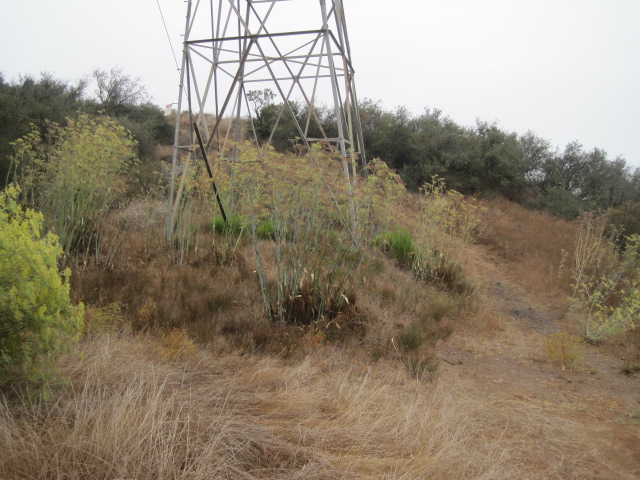
Just curious to get your take on it. Thanks!
Thanks for the input. That all makes sense to me.
One question I have: Out here in SB, there are many xc trails and even fire/use roads that are probably pushing a 40% grade. The terrain is hardpacked dirt/clay with light gravel scattered about it. Coming down some of these paths, I've felt as sketched out as ever, even though common sense tells me it shouldn't be a big deal.
What path of action would you take if your only option down would be along a surface like this? I've got a picture, at least illustrating the grade. This is the summit/overlook of this trail. Usually the plants that are shown in this pic are not very present on the trail or fire road.

Just curious to get your take on it. Thanks!
-
tracker
- Posts: 199
- Joined: Wed Jul 25, 2012 11:20 pm
I'm sure a subject matter expert could explain it thoroughly but I can't. It has something to do with the same things that make us right or left-handed. Balance and coordination are part of that too.MattCav wrote:why is that tracker?This may sound silly but if you are right-handed you should blade your right side and foot forward. Lefties can often lead with either foot.
Look around at how many things are set up to work right side forward, (counter-clockwise): nascar, ice skating, track and field events....
-
Sean

- Cucamonga
- Posts: 4283
- Joined: Wed Jul 27, 2011 12:32 pm
Your description sounds like trying to come down Bastard Ridge from Jones Peak, which is not my idea of fun. I don't think it's safe to attempt any speed on such descents. If it's scary steep and hardpacked, the technique I use is to sit on my ass and slide down in a relatively controlled manner, using my heels and hands for braking. You want to have a clear view of what's ahead, though, before building up any momentum. You don't want to get out of control right before a cliffy area. Look for any sort of weeds or small plants you can step on and use for traction.MattCav wrote: Out here in SB, there are many xc trails and even fire/use roads that are probably pushing a 40% grade. The terrain is hardpacked dirt/clay with light gravel scattered about it...What path of action would you take if your only option down would be along a surface like this?
On hardpack with, say, a 30 or 35% grade, I sometimes do a sort of shuffle run, keeping my feet close to or skimming the ground for traction, and with my body and feet angled slightly right or left for better balance. Kind of hard to describe. Basically the idea is to rough up the surface a little with the grip on your shoes instead of simply planting a step like normally and hoping for the best. Try to work the surface as best as you can. Any little bit will help you not slip.
-
MattCav

- Posts: 356
- Joined: Thu Sep 23, 2010 4:13 am
That makes sense... kinda like kickstepping in snow.On hardpack with, say, a 30 or 35% grade, I sometimes do a sort of shuffle run, keeping my feet close to or skimming the ground for traction, and with my body and feet angled slightly right or left for better balance. Kind of hard to describe. Basically the idea is to rough up the surface a little with the grip on your shoes instead of simply planting a step like normally and hoping for the best. Try to work the surface as best as you can. Any little bit will help you not slip.
thanks!
-
Taco

- Snownado survivor
- Posts: 6175
- Joined: Thu Sep 27, 2007 4:35 pm
Sometimes what works in scree is to keep yer feet in the mix. Don't lift them above ground, just kinda 'knead' the ground and you'll moonwalk all the way down.
-
MattCav

- Posts: 356
- Joined: Thu Sep 23, 2010 4:13 am
makes sense, taco. i've kind of been doing that, just lifting my feet maybe an inch off the ground. definitely seems to help me too, thanks.
-
Sean

- Cucamonga
- Posts: 4283
- Joined: Wed Jul 27, 2011 12:32 pm
These guys do a pretty good job of demonstrating proper scree skiing techniques:
-
outwhere
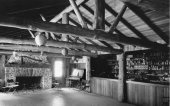
- Posts: 323
- Joined: Sun Jan 25, 2009 5:40 pm
Matt, I think Taco forgot to mention that much like the real Moonwalk - he goes down scree slopes backwardTaco wrote: Sometimes what works in scree is to keep yer feet in the mix. Don't lift them above ground, just kinda 'knead' the ground and you'll moonwalk all the way down.
What fun/challenge would it be to go down a scree slope any other way...
Sean, that video you posted - I didn't know they have those kind of mountains in Oklahoma...
-
MattCav

- Posts: 356
- Joined: Thu Sep 23, 2010 4:13 am
LOL Sean! That is the ideal music for scree descents.
-
HikeUp

- Posts: 4063
- Joined: Thu Sep 27, 2007 9:21 pm
Google Mt. Yamnuska scree running. My knees hurt just watching that stuff.
